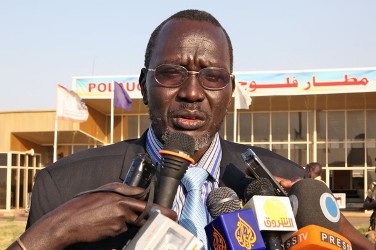China earmarks $43m for S. Sudan’s mining sector
September 9, 2013 (JUBA) – The Chinese government has earmarked $43m to conduct a geological study in South Sudan as the country plans to diversify into other sectors of its oil-rich economy.

Qiang, accompanied by the petroleum and mining minister, Stephen Dhieu Dau, also said plans are underway by the Chinese government to support the young nation in developing the road, power and agricultural sectors of the country.
“We want to enhance the friendship and the very good relationship with South Sudan so as to encourage a lot of Chinese companies to join the development of South Sudan”, the envoy remarked.
Early this year, South Sudan signed a mining law to attract foreign investment, with the initiative seen as a huge boost to the seemingly dormant sector.
The new law, according to Dau, will give Chinese companies the opportunity to invest in South Sudan in the areas of petroleum and mining industries, among others.
Meanwhile, South Sudan plans to double its oil production to 200,000 barrels of oil per day, after Khartoum and Juba agreed on continued flow of the oil.
NEARLY $1BN REALISED
South Sudan realized US$969m as gross revenues after selling 9.97 million barrels of oil from its Dar and Nile blends since May, the petroleum and ,ining ministry said in a recent statement.
The landlocked country will, however, pay Sudan $238m out of what it earned, as transportation and procession costs in the Transitional Financial Arrangements.
Dau vowed to ensure more transparency on oil sales and revenues so as to promote accountability in the sector.
South Sudan government, under the Petroleum Act, is required to avail to the public all information on oil production and sales.
Last week, Khartoum announced that oil from South Sudan will continue to flow without any interference, despite its earlier plan to close the pipeline on September 6.
But Dau remains optimistic that the country’s oil will continue to flow through neighboring Sudan due to the improved spirit of cooperation between the two countries.
South Sudan’s economy is dependent on oil production and exportation, but the landlocked country still relies on Sudan for exportation of its crude. The young nation took with it nearly 75% of the oil it previously shared with Sudan when it seceded from the latter in July 2011.
(ST)
